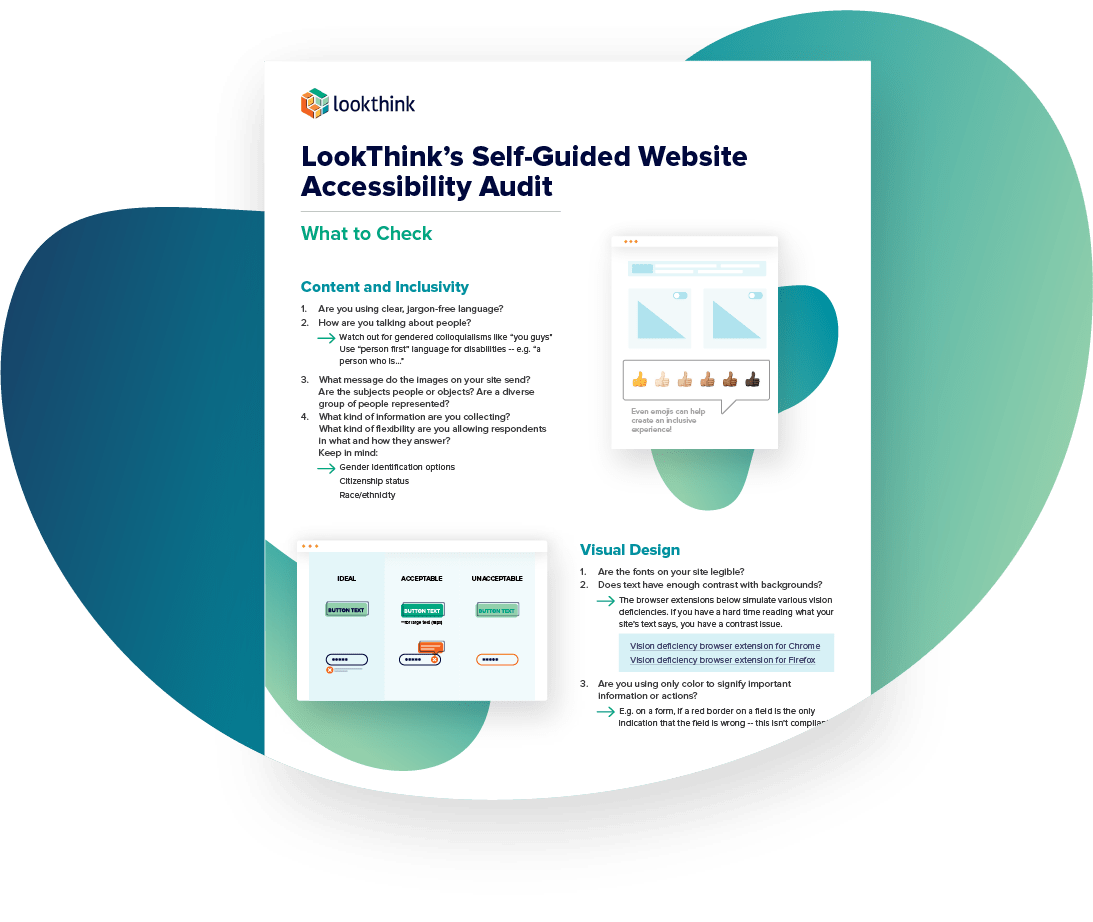Accessibility is one of the most important issues facing online businesses today and yet, it's not uncommon for businesses to still be unclear about what accessibility actually means. Accessibility means that all websites, tools and technologies are designed and developed to be used by everyone, including individuals with a variety of disabilities. Everyone should have the ability to understand, navigate and interact with a website and contribute to the web, including by the use of assistive technologies. However, as the Internet has evolved, many sites have left behind users that need that assistive technology. Businesses now more than ever have a responsibility to create inclusive environments for their visitors and here's why.
1. You could get sued.
The risk of an ADA lawsuit is no joke. The ADA is a civil rights law, meaning that all areas open to the public must be accessible by all - and this includes websites. Remember when Domino's got sued because their website was incompatible with screen readers resulting in a blind person unable to order pizza? More importantly, remember when Domino's actually fought this lawsuit in court and asked the Supreme Court to proclaim websites don't have to be accessible? All this turned into was negative PR for Domino's, which wasn't exactly a good look for them. If you think you're safe, think again: the number of federal web accessibility lawsuits nearly tripled in 2018. Not even Beyonce` could get away with it.
2. You could be losing potential customers.
If a person can't use your website, they're likely not going to buy your product. You're inadvertently creating an impossible situation for them to complete a purchase. Did you know that according to the U.S. Census Bureau, 1 in 5 people is living with a disability? That's a lot of prospective customers you're ignoring! And if you think you would've heard by now if your website was hard to use, odds are, you probably won't. According to the U.K.'s 2016 Click Away survey, nine out of 10 people don't bother complaining about a website's accessibility problems; they just... click away. Hopefully that one person doesn't let you know about it through a lawsuit!
3. Help your employees perform to the best of their ability.
Your customers aren’t the only ones who could benefit from accessibility -- your employees may need the support as well. If 1 in 5 Americans has a disability, odds are that some of your workforce have some form of disability. Taking all your employees and their abilities into account when you design internal systems can improve productivity and efficiency. When we worked with a major global hospitality network, our system enhancements helped one employee with vision issues go from the bottom 10% to a top performer -- and improved the experience for all employees along the way.
4. Better accessibility can mean better SEO.
It turns out that search engine optimization and accessibility optimization have a ton of overlap. For example, CNET created transcripts for their videos and this increased search traffic by 30%!
According to Moz, SEO and accessibility can overlap in the following ways:
- Video transcription
- Image captioning
- Image alt attributes
- Title tags
- Header tags (H1, H2, etc)
- Link anchor text
- On-site sitemaps, table of contents, and/or breadcrumbs
- Content ordering
- Size and color contrast of text
- Semantic HTML
SEO and accessibility are two different crafts but it's important to understand the overlap so your site can be awesome at both. If you're interested in learning more about the relationship between accessibility and SEO, check out this accessibility optimization series that talks more in-depth about page layout, linking, and image optimization.
5. You can leave a more positive brand impression.
The Bureau of Business Accessibility states that accessibility should be part of your brand strategy and we think so too. If more people have positive interactions with your brand, that's pretty powerful. So you should be including as many people as you can in that total! Even just providing an accessibility statement and making it known that your company is dedicated to being inclusive can speak volumes and leave a lasting impression on visitors.
6. It's the right thing to do.
At LookThink, we believe that access to the Internet is a fundamental right. Tim Berners Lee, the inventor of the World Wide Web, proclaimed:
It's important not to forget that and to uphold this wish to make the internet accessible for all. The internet is a key component of our modern-day lives and we interact with it in some way multiple times every day. Businesses have to make accessibility a priority to ensure that all site visitors can access their content. If you're interested in learning more, register for our free webinar on inclusive design or contact us."The power of the Web is in its universality. Access by everyone regardless of disability is an essential aspect."

